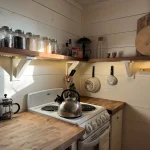A refrigerator is more than just an appliance; it’s the heart of your kitchen. It keeps your food fresh, your drinks cold, and your ice cream perfectly frozen. With so many options available, choosing the perfect refrigerator for your kitchen can be overwhelming. But don’t worry – this guide will help you navigate through the choices to find the refrigerator that best fits your needs and lifestyle.
Understanding Your Needs
The first step in choosing the perfect refrigerator is understanding what you need. Think about your cooking habits, the size of your family, and your kitchen space. Do you need a lot of freezer space? Do you entertain often and need extra room for party platters? Consider these factors before you start shopping.
Size Matters
One of the most important factors to consider is the size of the refrigerator. Measure the space where the refrigerator will go, and don’t forget to account for the doors opening. A too-large refrigerator might not fit, while a too-small one might not meet your needs.
Jack Bishop from Good Housekeeping Institute says, “The refrigerator is a kitchen workhorse, so choosing one that fits your family’s needs and lifestyle is crucial. Consider factors like size, features, and energy efficiency when making your decision.”
Types of Refrigerators
There are several types of refrigerators to choose from, each with its advantages and disadvantages.
Top-Freezer Refrigerators
Top-freezer refrigerators are the classic style, with the freezer compartment on top and the refrigerator below. They tend to be more affordable and offer a lot of storage space.
Bottom-Freezer Refrigerators
Bottom-freezer refrigerators have a freezer compartment on the bottom, making it easier to access frequently used refrigerator items. This style can be more convenient, but it may be pricier than top-freezer models.
Side-by-Side Refrigerators
Side-by-side refrigerators have the freezer on one side and the fridge on the other. They often have more freezer space than other models and offer easy access to both compartments. However, they may not fit wide items like pizza boxes.
French Door Refrigerators
French door refrigerators have two doors open to the refrigerator compartment, with a freezer drawer below. They offer a lot of space and flexibility, making them a popular choice for modern kitchens.
Compact Refrigerators
Compact refrigerators are smaller and ideal for small kitchens, dorm rooms, or secondary fridges. They don’t offer as much storage but are perfect for limited spaces.
Key Features to Consider
When choosing a refrigerator, look for features that will make your life easier and your food fresher.
Adjustable Shelves and Door Bins
Adjustable shelves and door bins can help you customize the interior layout to fit your needs. Jaimie DeLine, an appliance expert, notes, “Beyond aesthetics, consider the interior layout of the refrigerator. Adjustable shelves, door bins, and dedicated storage compartments can significantly impact its functionality and organization.”
Temperature Control
Precise temperature control is crucial for keeping your food safe and fresh. Look for refrigerators with digital temperature controls and alarms that alert you if the temperature rises above safe levels. Alice Mendes, a food safety expert, advises, “Temperature control is crucial for food safety. Choose a refrigerator with precise temperature settings and alarms to alert you if the temperature rises above safe levels.”
Energy Efficiency
Energy efficiency is an important consideration for both the environment and your wallet. Mark Goldstein, an energy efficiency expert, recommends, “Energy efficiency is a key factor when selecting a refrigerator. Look for models with ENERGY STAR certification and features like insulation and door seals to reduce energy consumption.”
Ice and Water Dispensers
Many modern refrigerators come with built-in ice and water dispensers. These can be convenient, but they also require maintenance and can take up space inside the fridge.
Smart Features
Smart refrigerators are becoming more popular, offering features like Wi-Fi connectivity, touch screens, and voice control. These can add convenience but also come with a higher price tag.
Reliability and Warranty
When investing in a new refrigerator, you want to ensure it’s reliable and durable. David Salvatore, an appliance repair technician, suggests, “Reliability and durability are essential qualities in a refrigerator. Consider the brand’s reputation for quality and longevity, as well as warranty coverage.”
Expert Advice
To help you make the best choice, here are some expert tips:
- Jack Bishop, Good Housekeeping Institute: “The refrigerator is a kitchen workhorse, so choosing one that fits your family’s needs and lifestyle is crucial. Consider factors like size, features, and energy efficiency when making your decision.”
- Jaimie DeLine, Appliance Expert: “Beyond aesthetics, consider the interior layout of the refrigerator. Adjustable shelves, door bins, and dedicated storage compartments can significantly impact its functionality and organization.”
- Steve Thomas, Kitchen and Bath Designer: “A refrigerator should complement your kitchen’s style and design. Whether you prefer a sleek stainless steel finish or a classic white model, choose a refrigerator that enhances your overall aesthetic.”
- Mark Goldstein, Energy Efficiency Expert: “Energy efficiency is a key factor when selecting a refrigerator. Look for models with ENERGY STAR certification and features like insulation and door seals to reduce energy consumption.”
- Alice Mendes, Food Safety Expert: “Temperature control is crucial for food safety. Choose a refrigerator with precise temperature settings and alarms to alert you if the temperature rises above safe levels.”
- David Salvatore, Appliance Repair Technician: “Reliability and durability are essential qualities in a refrigerator. Consider the brand’s reputation for quality and longevity, as well as warranty coverage.”
Studies and Resources
Several studies and resources can help you make an informed decision:
- Department of Energy (DOE): The DOE conducts research on energy efficiency in appliances, including refrigerators. Their studies provide insights into energy-saving features and technologies.
- Consumer Reports: Consumer Reports tests and reviews various appliances, including refrigerators. Their research can help consumers compare different models based on performance, features, and reliability.
- National Renewable Energy Laboratory (NREL): NREL focuses on renewable energy and energy efficiency. Their research on appliance energy efficiency can provide valuable information on choosing energy-saving refrigerators.
- Food and Drug Administration (FDA): While not directly related to refrigerator selection, the FDA provides guidelines on food safety and storage temperatures. Understanding these guidelines can help consumers choose a refrigerator that maintains optimal food safety conditions.
Conclusion
Choosing the perfect refrigerator for your kitchen is an important decision that requires careful consideration of your needs, space, and lifestyle. By understanding the different types of refrigerators and their key features, you can make an informed choice that will keep your food fresh and your kitchen stylish.
Remember to measure your space accurately, think about your storage needs, and consider energy efficiency and reliability. With the right refrigerator, you can ensure that your kitchen remains the heart of your home, providing you with fresh food and cold drinks for years to come.









